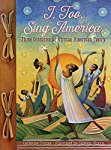Many of us take education for granted. It does not occur to us that being able to go to school and university is a privilege. Not that long ago, African Americans were not allowed to learn how to read and write, and even when the doors of schools were finally open to them, the education that they received was mediocre at best.
Luckily for us many African Americans found their voices in spite of racism, segregation, and inequality. They learned how to read and write, they went to school, they put up with all kinds of privations, and they created marvelous stories and poetry. Today's poetry title is a celebration of African American poetry, and the book is packed with poems that delight the ear and excite the mind.
 I, too, sing America: Three Centuries of African American Poetry
I, too, sing America: Three Centuries of African American Poetry
Luckily for us many African Americans found their voices in spite of racism, segregation, and inequality. They learned how to read and write, they went to school, they put up with all kinds of privations, and they created marvelous stories and poetry. Today's poetry title is a celebration of African American poetry, and the book is packed with poems that delight the ear and excite the mind.
 I, too, sing America: Three Centuries of African American Poetry
I, too, sing America: Three Centuries of African American Poetry
Catherine Clinton
Illustrated by Stephen Alcorn
Poetry
For ages 9 and up
Houghton Mifflin, 2017, 978-0544582569
The slaves who were brought to America were subjected to
unspeakable cruelties. Deprived of their family members, their community, their
history, their culture, and their language, they were cut off from everything
that was familiar. After being sold, they (and many of their descendants) were
denied the right to learn how to read and write, but countless creative African
Americans found ways to bring glorious language into their lives through song.
Then there were those who learned how to read and write in secret; others were
lucky enough to be working for enlightened people who allowed them to become
educated.
In this
wonderful book, readers will encounter the stories and the writings of African
American poets, beginning with those who were brought to the United States as
slaves, and ending with poets who are creating poems for present day readers.
The collection
begins with the story of, and a poem written by, Lucy Terry. Lucy was born in
Africa, sold into slavery, and then she went to live in a community in
Massachusetts that was greatly affected by an Indian raid which took place on
the twenty-fifth of August in 1746. Lucy wrote about the raid in her poem Bars Fight, in which she memorializes
the people who died in the attack. The poem was passed down orally from person
to person for generations until it was published in 1855.
Phyllis Wheatley,
who was born in the Gambia, was special in that she was greatly supported in
her writing journey by the people who bought her. She learned to read and write
English, and was only fourteen when her first verse was published. She went on
to learn Latin, and a patron helped her find a London publisher for her
collection of verse. Phyllis even made the journey across the Atlantic so that
she could meet some of her admirers in England. Her poem Liberty and Peace captures her belief in “the principals that fuels
the American Revolution and the antislavery movement…”
We go on to meet
George Moses Horton, who, unlike Phyllis, was denied an education and so he
wrote his poems in his head. He shared his writings with students who were
studying at the nearby University of North Carolina. George’s patrons wanted to
buy his freedom but his master refused to allow this. George did find a way to
learn how to write, and in all he wrote three volumes of poetry. In his poems
George often openly spoke about the “agony of bondage and the desire for
liberty” which we can see for ourselves when we read his poem On liberty and slavery. The poem is an
appeal that is heartfelt and powerful.
Other poets
whose stories and poems appear in this collection include W.E.B. Du Bois,
Langston Hughes, Margaret Walker, Maya Angelou, and Nikki Giovanni.
Readers of all
ages will be captivated by this extraordinary collection. We get to know each
poet a little by reading their biographies, and then get to experience their
writing through their poems. It is interesting to see how the styles and
subject matters in the poems changed as the years went by, and to see how the
poems were influenced by what was happening in the world at the time when they
were written.
1 comment:
When looking for an MBA essay editing service, make sure that you look at a few things. First of all, it can cost a pretty penny, so it's important to shop around before you settle on anything.visit the site
Post a Comment